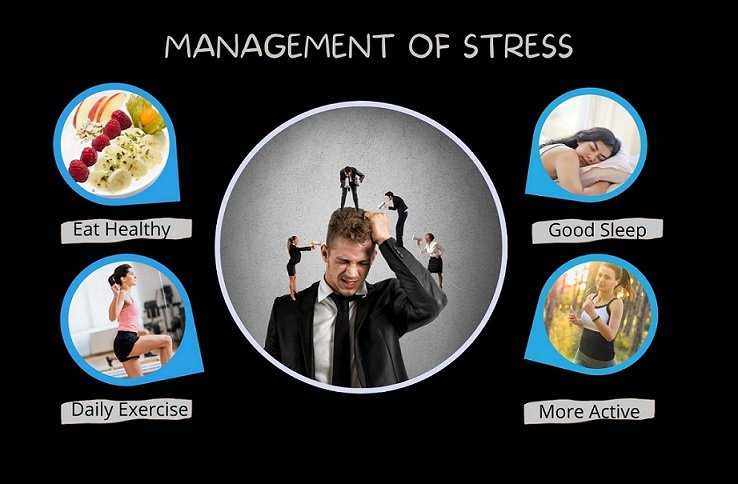Stress Mangement – Key to Prevent Health Problems
By Dr.Vasudha Sharma | May 16, 2022
Stress is the body’s method of reacting to a condition such as a threat, challenge or any other physical and psychological hurdles. Any external stimuli that alter an organism’s environment are responded to by multiple systems in the body. In humans, the autonomous nervous system and hypothalamic-pituitary-adrenal (HPA) axis are the two major systems that respond to Stress.

Stress is a physiological response to a threat. The responses of the body such as constricted blood vessels, increased blood pressure, increased respiratory and pulse rate are all due to the hormones cortisol and adrenaline which are produced as a defensive mechanism in the body. In other words stress is not just a feeling it exists as a physiological manifestation in the body. In case of chronic stress, these physiological changes overtime can lead to serious health problems.
Through these mechanisms, stress can affect memory, immune mechanism, metabolism and susceptibility to diseases. Disease risk is particularly pertinent to mental illnesses, whereby chronic or severe stress remains a common risk factor for several mental illnesses as well as irreversible physiological changes in the body.
Health conditions arising due to stress
- Obesity : stress can lead to eating disorders and slow digestive processes. These along with high cortisol levels in the body will lead to deposition of fat. This in turn becomes a vicious cycle where one is unable to maintain a healthy weight.
- Ibs and Gerd : Gastrointestinal disorders such as irritable bowel syndrome, gastroesophageal reflux disorder, chronic ulcers get worse due to stress. Although all of these can exist independently, stress increases their chance to manifest more rigorously.
- Allergies : Asthma and various auto-immune disorders are directly related to stress. They are either triggered or worsened due to stress.
- Headache, Depression, Anxiety : Tension headaches, migraines, Depression and anxiety are all related to chronic stressful conditions in some form or the other.
- Heart Disease : Stress can have an impact on increasing heart rate and blood flow. It can also cause the release of cholesterol and triglycerides into the blood.
- Diabetes : Stress can harm those already diagnosed with diabetes. It can cause people to binge on unhealthy foods high in carbohydrates, and that can cause glucose levels to surge. People who are predisposed to diabetes, either through a family history or lifestyle habits, can increase their risk by stress-induced overeating.
The list of health issues arising due to stress is big but it is also a fact that it is easily preventable and manageable provided we recognise its existence in our lives and act wisely.
Prevention and Management of Stress
You can prevent or reduce stress by planning ahead and preparing for any important events both emotionally and mentally. Many of the conditions occur as a surprise and some are hard to avoid.
Finding ways to manage such stress in different ways such as
- Noticing when you feel stressed
- Taking time to relax
- Getting active and eating healthy
- Finding solutions to problems you’re having
- Talking to friends and family

Changing the diet and lifestyle to include healthy habits for both mind as well as body is important in stress management.
- Eat healthy : Eat a balanced diet, avoid food laden with carbohydrates and fats. Eat more fruits and vegetables to provide energy and have a positive effect on the mind-body. Easily digestible food which will not lead to any gastric discomfort.
- Regular exercise : Regular exercise brings about discipline in lifestyle and also reduces the unhealthy accumulation of fat in the body. Increases the tonicity of muscles which can aid in everyday life and challenges.
- Good Sleep : Having good night sleep can bring down stress hormones in the body to a large extent. Following a good schedule for setting a sleep pattern will help the body repair the tissues and heal on its own.
- Social interactions : Finding a company of understanding individuals with a positive outlook help relieve stress. This is the most underestimated method for managing any stressful condition. On the other hand, being in the wrong company can worsen the situation.
The Best Stress Management Techniques
Although many techniques have traditionally been developed to deal with the consequences of stress, considerable research has also been conducted on the prevention of stress, a subject closely related to the number of self-help approaches to stress-prevention and resilience-building.
- Active management of stress can be done through many techniques and treatment methods.
- Meditation can lower stress, anxiety, and chronic pain as well as improve sleep, energy levels, and mood.
- Mindfulness for broadening the awareness around any activity the individual goes through.
- Music therapy is a proven way to bring beneficial results in stress.
- Deep breathing, When you practise deep breathing, you turn on your body’s natural ability to relax. This creates a state of deep rest that can change how your body responds to stress. It sends more oxygen to your brain and calms the part of your nervous system that handles your ability to relax.
- Yoga Nidra deals with relaxation through guided imagery. It has benefits not only in stress but also balancing activity of vital organs in the body.
- Prayers connecting to the divine is an age-old way of bringing down cortisol in the body for everyday living.
Humour, spending time in nature, spending quality time with pets all of these activities have an inherent positive side effect on health.
Article By :
Dr.Vasudha Sharma





